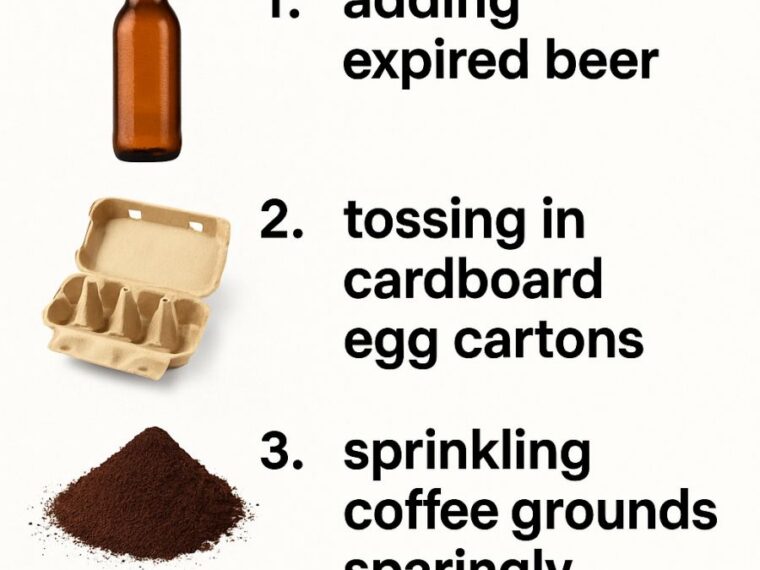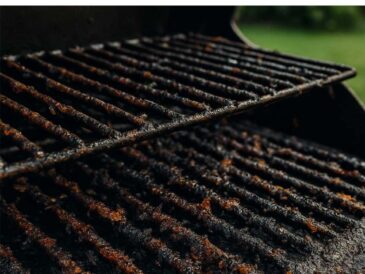Composting is an ancient practice that transforms organic waste into nutrient-rich soil, but it can sometimes be a slow process. For those eager to see quicker results, there are numerous unusual tricks that can speed up decomposition while enhancing the quality of the compost. This article explores ten weird yet effective techniques that can accelerate composting, making your garden thrive faster than expected.
By incorporating these unconventional methods, you can significantly reduce the time it takes for your compost pile to break down, all while enriching the soil with vital nutrients. Whether you’re a seasoned gardener or a beginner, these tricks will not only improve your composting process but also help you discover new ways to recycle household waste into valuable garden resources.
1. Add Expired Beer for Quick Decomposition
Expired beer might seem like a waste product, but it can actually be a boon for your compost pile. Beer is rich in yeast and sugars, which can accelerate the decomposition process by feeding the microorganisms that break down organic matter. Simply pour a can or bottle of expired beer over your compost pile, ensuring it’s evenly distributed. The yeast will stimulate microbial activity, boosting the rate at which your compost breaks down.
It’s important to use this trick sparingly, as too much liquid can saturate the compost and slow down the process. Aim to add one can of beer per cubic yard of compost every few weeks to maintain an optimal balance of moisture and microbial activity.
2. Toss in Cardboard Egg Cartons for Aeration
Cardboard egg cartons are an excellent addition to your compost pile, providing both aeration and carbon. Tear the cartons into small pieces before adding them to your compost. The structure of the cardboard helps create air pockets within the pile, improving airflow and speeding up decomposition.
Additionally, the cardboard acts as a brown material, balancing out the nitrogen-rich green materials in your compost. This balance is crucial for efficient composting, as it prevents the pile from becoming too wet or compacted. Make sure to mix the cardboard pieces throughout the compost to ensure even decomposition.
3. Sprinkle Coffee Grounds Sparingly for Nitrogen Boost
Coffee grounds are a fantastic source of nitrogen, an essential element for the growth of microorganisms in your compost. While it’s tempting to add all your used coffee grounds at once, it’s best to sprinkle them sparingly to avoid creating a dense layer that can hinder airflow.
Approximately one cup of coffee grounds per square foot of compost should suffice. This will provide a nitrogen boost without overwhelming the pile. The grounds also help improve the soil structure and attract earthworms, which further aid in breaking down organic material.
4. Microwave Scraps Before Composting to Kickstart Breakdown
Microwaving kitchen scraps before adding them to your compost can help kickstart the breakdown process. By heating the scraps, you begin to break down the cell walls, making it easier for microorganisms to decompose the material.
To use this trick, simply microwave your vegetable and fruit scraps on high for about a minute before adding them to the compost. Be sure to let them cool before mixing them into the pile to avoid killing beneficial microbes with excessive heat.
5. Use Shredded Newspaper for Carbon Balance
Shredded newspaper is an excellent addition to your compost, serving as a carbon-rich material that balances out nitrogen-heavy green waste. It’s important to ensure the newspaper is shredded to increase surface area and promote faster decomposition.
Add a layer of shredded newspaper every time you add a fresh batch of kitchen scraps or grass clippings. This will help maintain the carbon to nitrogen ratio, preventing the pile from becoming too wet and smelly. Ensure that the newspaper is non-glossy and free from colored inks, as these can introduce toxic substances into your compost.
6. Incorporate Hair Clippings to Increase Protein Content
Hair clippings, whether from humans or pets, are a surprisingly effective addition to your compost pile. They contain nitrogen and proteins, which are essential for microbial growth. Scatter the clippings throughout the compost to prevent them from matting together, which can impede airflow.
It’s advisable to use hair clippings in moderation, as they decompose slowly. A small handful of hair clippings per cubic foot of compost will provide the necessary nutrients without overwhelming the pile. Over time, they will break down and contribute to the overall structure and nutrient content of the compost.
7. Add Crushed Eggshells for Calcium Enrichment
Eggshells are a natural source of calcium, an essential nutrient for plant growth. Before adding them to your compost, it’s beneficial to crush the eggshells into small pieces to speed up the decomposition process.
Add the crushed eggshells to your compost pile, mixing them in with other materials. Not only will they contribute calcium, but they will also help improve the soil structure by providing grit, which is particularly beneficial for aerating heavy soils.
8. Pour Coca-Cola to Accelerate Composting
Coca-Cola, with its high sugar and acid content, can be used to speed up the composting process. The sugars in the soda feed the bacteria and fungi in the compost, while the acidity helps break down organic material.
Pour about one cup of Coca-Cola over your compost pile once a month. Be careful not to overdo it, as excessive sugar can attract pests and create an imbalance in the compost. This trick works best when combined with regular turning of the compost to ensure even distribution and aeration.
9. Bury Banana Peels for Potassium Infusion
Banana peels are rich in potassium, an essential nutrient for plant health. Burying them in your compost pile allows them to break down slowly, releasing potassium and other nutrients into the soil.
To maximize their benefits, chop the banana peels into small pieces before burying them in the compost. This will help them decompose more quickly and evenly. Regularly turning the compost will also help distribute the nutrients throughout the pile.
10. Use Baking Soda to Reduce Odors
Baking soda is well-known for its odor-neutralizing properties, and it can be a useful tool in managing compost odors. Sprinkle a small amount of baking soda over your compost pile if you notice any unpleasant smells.
It’s important to use baking soda sparingly, as too much can alter the pH balance of the compost. A light dusting every few weeks should be sufficient to keep odors at bay without affecting the microbial activity necessary for decomposition.
11. Throw in Citrus Peels to Deter Pests
Citrus peels have a natural pest-repelling quality due to their strong scent and acidic nature. Adding citrus peels to your compost can help deter pests such as ants and rodents.
Chop the peels into small pieces to speed up their decomposition and ensure they are evenly distributed throughout the compost. While they can be beneficial, use them in moderation to avoid making the compost too acidic, which can slow down the decomposition process.




